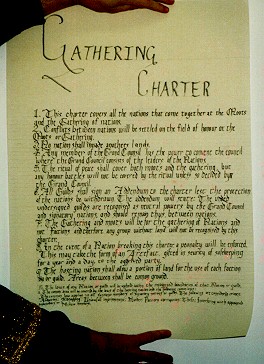This content predates Rules V4.x and may not be relevant to the way the game world works now
Research Article
The information contained in this article is the result of research done by players from within the Game World. The contents are only as factual as the original author intended and should not be unduly modified.
The Gathering Treaty
This document, originally written in 1091, has been torn apart, re-written, broken and patched so many times it is near impossible to know exactly what is and isn't in it, but the idea behind the original treaty, and the Ritual of Peace, still stands to this day.
On the 1091 Gathering Treaty declaration
During the discussions of the grand council, the Gathering Treaty was drawn up and signed by all the lord generals of the Heartlands. The treaty stated... and still states... that the Grand Council would discuss disputes between the factions in a civilised manner. Should a dispute not be resolved by diplomacy then, at an annual Gathering, representative forces of the disputing factions would fight a battle under a magical ritual of peace. This ritual would allow combatants to subdue, but not to kill, each other. The victory conditions for these battles would be determined before the combat took place. - The History of Erdreja
The Gathering Charter, 1099
 gathering charter
gathering charter
1. This charter covers all the nations that come together at the Moots and the Gathering of nations.
2. Conflicts between nations will be settled on the field of honour at the Moots or Gathering.
3. No nation shall invade another's lands.
4. Any member of the Grand Council has the power to convene the council where the Grand Council consists of the leaders of the nations.
5. The ritual of peace shall cover both moots and the gathering but any honour battles will not be covered unless so decided by the Grand Council.
6. All Guilds shall sign an Addendum to the charter lest the protection of the nations be withdrawn. the addendum will state: The undersigned guilds are recognised as neutral powers by the Grand Council and signatory nations should remain thus between nations.
7. The Gathering and moots will be for the gathering of Nations and not Factions and therefore any group without land will not be recognised by this charter.
8. In the event of a Nation breaking this charter a penalty will be enforced. This may take the form of an Artefact, gifted in security of safekeeping for a year and a day, to the aggrieved party.
9. The hosting nation shall allow a portion of land for the use of each faction or guild. areas between shall be common ground.
10. The laws of any Nation or guild will be upheld within the recognised boundaries of that Nation or guild.
11. The common area will be covered by the laws of the hosting nation and the following common laws: The common law applies to all sentient members of signatory nations or guilds. the following are considered crimes: Abduction; Kidnapping; Unlawful imprisonment; Murder; Pattern Corruption; Theft; Interfering with appointed ambassadors or Militia members.
The Above Charter was signed at the Open Grand Council of 1099.
The Gathering Treaty, 1108
This version of the Gathering Treaty appears to be the most recent, and is currently held on record for all to view by the Bards Guild
1) We accept that each faction has a right to exist as free and independent nations, including any sentient being beholden to a signatory.
2) We acknowledge each signatory's right to govern their own lands as they see fit.
3) We support the independence, neutrality and security of all Guilds, provided they continue to serve the faction.
4) Holding the above to be true, we formally agree to accept the following rights and responsibilities when dealing with other treaty signatories.
5) Factions and Guilds will openly declare a disagreement before taking action against another signatory of this treaty.
6) The land within a Faction or Guild camp will be under that body's law.
7) Anywhere normally within the host hospitality, for the duration of the event, not covered by Faction or Guild laws is regarded as neutral ground, and will have a set of rights and responsibilities enforced by the militia.
8) When diplomatic avenues have failed, complex issues can be decided by negotiated rules of engagement.
9) The rules of engagement are to agreed by the aggrieved signatories and a agreement has to be reached.
10) It is the responsibility of all signatories to ensure that the agreed rules of engagement are negotiated, reached and adhered to.
11) If any signatory breaks the Charter, they can expect the other signatories to take action as agreed by the majority.
12) No signatories will interfere with the punishment of sanction agreed to by the majority.

